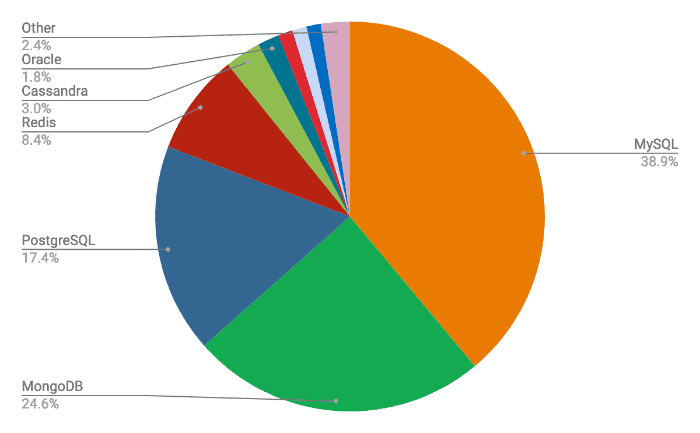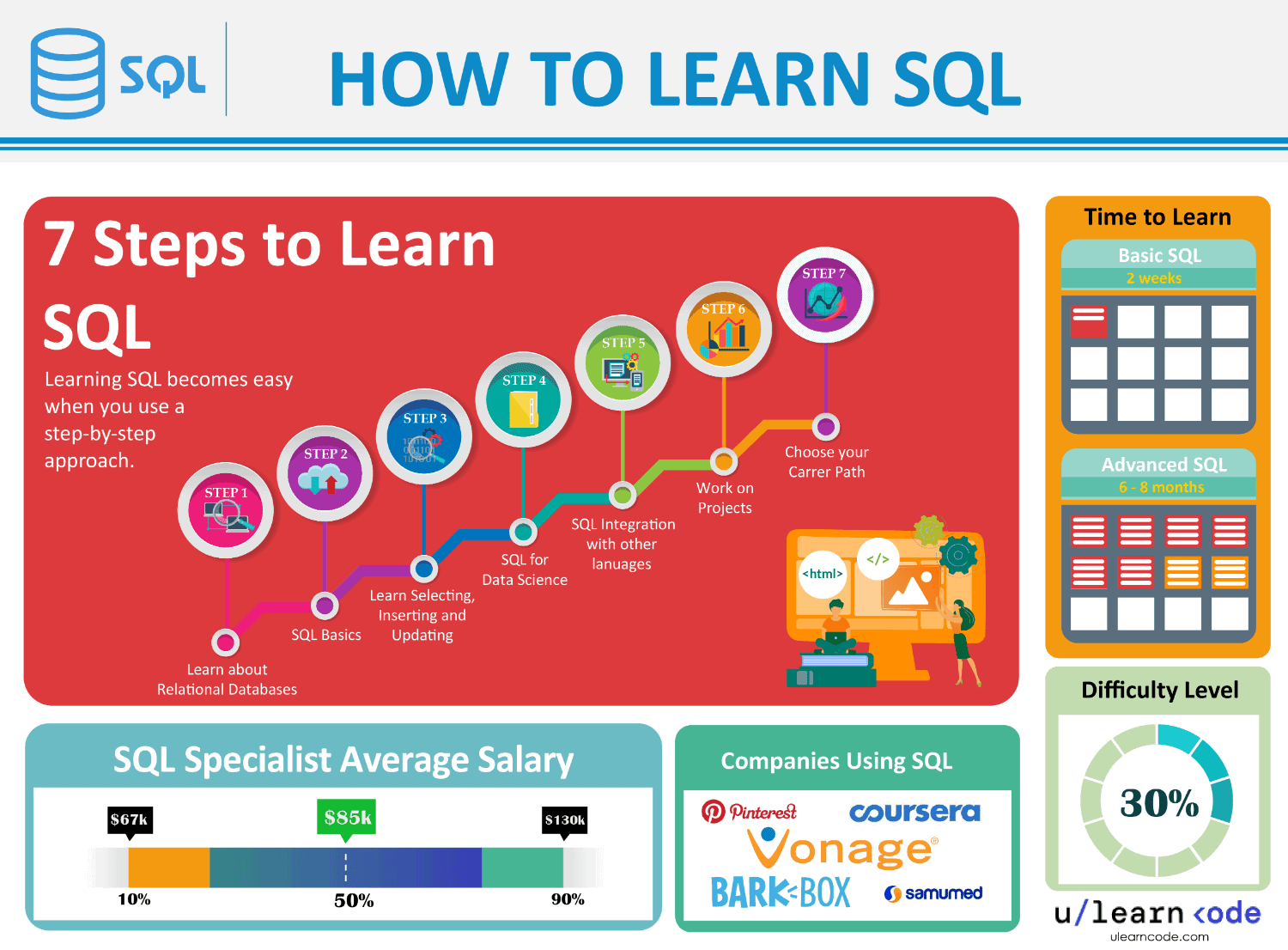Contents
SQL is a standard language for database systems and over 60% of data administrators use SQL for their relational databases. This structured query language is very proficient in organizing information in a proficient manner.
MySQL is the most popular relational database with over 38.9% market share, if we compare it to other similar systems such as MongoDB and Redis.

Undoubtedly, SQL is the most reliable language to communicate with databases. The language has a clear scope in RDBMS, but where else can it be utilized? There are a number of SQL applications including its usage in integration scripts, analytical queries, data control, etc.
The English-based syntax of SQL also makes it an easier and superior option for beginners who want to pursue their careers as database administrators. Before moving ahead, let’s first clear up some common questions regarding this language.
Is SQL Hard to Learn?
SQL is one of the easiest languages to learn and requires very little effort thanks to an over-simplified syntax that anyone with basic English understanding can pick up. SQL is more of a query language rather than a programming one. So make sure you know the difference.
Query languages deal with modification and data retrieval for the sake of achieving the desired information from certain databases. SQL language is like a gateway to communicate with those databases and it sends certain queries (or signals) to retrieve those desired results.
SQL does not include any confusing concepts or syntax that you have to forcefully remember for the sake of writing a query code. Everything is pretty much conceptual and you can easily have a stronger grip over this language if you keep practicing its statements.
It is quite easy to understand the basic concepts but things can get more complex on an advanced level where you have to deal with real-world scenarios and databases with lots of information.
How Long Does It Take to Learn SQL?
It takes about 2 to 3 weeks for an average learner with basic-English skills to learn SQL. This time period is enough to learn the basics of the language. The underlying concepts must be clear before moving to a professional end.
Learning time also varies from person to person. Some people tend to pick up concepts fast due to their focus and consistently dedicated time. Moreover, if you are a native English speaker, then it will be a lot easier to learn the commands and statements being used in the SQL.
If you take no interest in handling databases, then SQL should not be your language of choice. There are a range of other languages, such as Python, which open the door for a lot of new opportunities in multiple domains.
Lastly, you need to practice new concepts on a daily basis to engrave them in your mind or otherwise, syntax and concepts will fade away with the passage of time.
Best Way to Learn SQL

The pathway to learn this query language is clear and simple. The foremost thing you need is to develop an interest in databases, their types, and how they work. If you have chosen database management or other relevant fields as a career, then start learning SQL using our 7-step formula:
#1: Learn about Relational Databases
It is a smart step to learn about relational databases before you jump into SQL queries. These directories consist of structured data which is arranged, managed and modified using SQL. This definition is to give you a basic overview of RDBMS but there is a lot more that you need to learn.
To get a deep understanding of how these relational databases work and what the role of SQL is in this scenario, you need to watch several videos for a thorough guide:
- Relational Database Concepts
- Relational Database Defined
- Database Tutorial for Beginners
- Relational Model in DBMS
These videos will give you a good understanding about your future career. If you are finding it hard to digest the concepts, then take your time to develop the interest before moving on to the next step.
#2: SQL Basics
Once you are familiar with relational databases and how they work, it’s time to learn SQL to control the way they behave. There are a number of great SQL courses available that teach you all these basic concepts in the most efficient way.
You need to learn SQL basic commands that will be regularly used in your queries, so make sure you understand the meaning and function of each command before you actively use it. You can easily guess the functionalities of many commands if you are a native English speaker.
Fortunately, there are a number of free sources available to teach you SQL. If you cannot afford a paid course, then these sources can be utilized for self-learning:
- SQL Tutorial – Full Database Course for Beginners
- MySQL Tutorial for Beginners [Full Course]
- SQL Full Course – SQL Tutorial For Beginners
The basic concepts cannot be compromised because your advanced database skills will be dependent on underlying fundamentals. It is also recommended to explore SQL Examples to get an idea of how queries are written.
#3: Learn Selecting, Inserting, and Updating
These are three of the core commands of SQL that you should learn before anything else. If you want to make a simple query to a database then SELECT is the right command to use. Predictably, the INSERT command deals with the insertion of new records.
The UPDATE command is used to update certain columns in your database system where modification is required. These three simple commands create a huge impact on your query writing. You can learn them here:
- Selecting Data (from SQL Course)
- Inserting into a Table (from SQL Course)
- Updating Records (from SQL Course)
#4: SQL for Data Science
If your aim is to pursue a career as a data scientist, then this is the right stage to explore a few more relevant ideas. After all, the field is meaningless without a well-managed database.
If you have become proficient enough in SQL that you can manage tables, use joins and make views for complex querying then it’s time to use your skills in the data science field.
Data Modeling is the foremost concept you will need to understand and SQL provides a solid foundation for effective analysis.
Utilization of SQL in Data Sciences
#5: SQL Integration with Other Languages
SQL is often embedded into other programming languages to make a connection between different ends of a website, application or software. Particularly in the case of web development, PHP often needs to make calls to the database using the SQL input.
Python and R languages are widely used in data science fields and SQL is also often a part of their development. It’s highly recommended to explore how different languages integrate with SQL. It will eventually push you to learn a new programming language that will further enhance your skills.
#6: Work on Projects
It is always a good idea to practice your skills by gaining hands-on experience on real projects. You can easily get some low paying management projects that will give you a complete overview of how an original database is handled and managed.
There will be many query errors at first, but keep improving by searching for a solution on forums and other channels. You can also contact an expert if you are stuck in a confusing scenario.
#7: Choose Your Career Path
In how many different ways can you actually utilize your SQL skills to convert them into a proper life-long career? Well, the options are limited, but they carry a lot of potential for experienced database managers.
You can become an SQL Developer who checks and optimizes functionalities by writing different queries. It is also possible to work on statistical modeling: Data Administrator, Data Modeler, Database Tester and Data Analysts are only a few professional career paths.
Surprisingly, many marketers also learn SQL for enhancing their skills. It allows them to target users with specific demographics information present in the database, retrieved by SQL queries.
Businesses are not far behind as they also utilize SQL to understand customer behavior and demands using available data. This information really helps businesses to improve their current position.
To Sum Up
SQL is a worthwhile language that can be learned by anyone. Whether you have any prior experience with programming or not, grasping SQL concepts is an easy job. Above all, you gain the ability to surf through tons of information using various filters and queries.
A number of other career options can also become available by adding a few additional skills sets for yourself, such as learning Python along with SQL, to deal with data sciences.